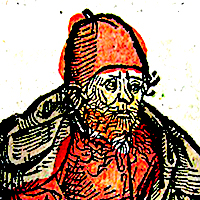

Tao Te Ching

Cicero
106 – 43 BCE
One of Rome's greatest orators and writers with an immense influence on European languages greater than any other writer in history, Cicero introduced Greek philosophy and as a ground-breaking translator invented new Latin terms for philosophical concepts. His rediscovery sparked both the 14th Renaissance and the 18th century Enlightenment. Refusing an invitation for highest office from Julius Caesar, he championed democracy, fought against dictatorship and for these reasons was killed by Mark Antony. He inspired both the American and French Revolutions as well as everything from Jefferson’s writing of the Declaration of Independence to Copernicus placing the sun rather than the earth at the center of our solar system.
Lineages
Epicureanism Politicians Roman / Italian
Eras
Chinese
Western Han (206 BCE – 9 CE)Unlisted Sources
Ad Familiares IX, 4
De Amicitia, 44 BCE
De finibus, IV, 50 BCE
De Legibus, 52 BCE
De Officiis, 44 BCE
De Re Publica, 54-51 BCE
De Republica, 54-51 BCE
De Senectute, 44 BCE
Epistola ad Atticum
On Friendship
Paradoxa Stoicorum
Tuscalanes Disputationes, 47-44 BCE
Quotes by Cicero (31 quotes)
“The good of the people is the highest law.”
from De Legibus, 52 BCE
Comments: Click to comment
“The more laws, the less justice.”
from De Officiis, 44 BCE
Comments: Click to comment
“Pleasure has no fellowship with virtue... of all the enemies that reason has, pleasure is the chief.”
from De Senectute, 44 BCE
Comments: Click to comment
“To live is to think. Reason is the mistress and queen of all things.”
from Tuscalanes Disputationes, 47-44 BCE
Comments: Click to comment
“Philosophy is the best medicine for the mind.”
from Tuscalanes Disputationes, 47-44 BCE
Comments: Click to comment
“The whole life of the philosopher is a preparation for death... I quit life as if it were an inn, not a home.”
from Tuscalanes Disputationes, 47-44 BCE
Comments: Click to comment
“In a republic this rule ought to be observed: that the majority should not have the predominant power.”
from De Re Publica, 54-51 BCE
Comments: Click to comment
“With the exception of wisdom, humanity has nothing better than friendship.”
from De Amicitia, 44 BCE
Comments: Click to comment
“The most difficult task in our lives is to know ourselves.”
Comments: Click to comment
“Of all the gifts of the gods to the human race, philosophy is the richest, the most beautiful, the most exalted.”
from De Legibus, 52 BCE
Comments: Click to comment
“Avarice of the old... how absurd to increase one's baggage as one nears their journey's end.”
from De Re Publica, 54-51 BCE
Comments: Click to comment
“[Xenophon's prose is] sweeter than honey.”
Comments: Click to comment
“A man more intelligent than learned.”
Comments: Click to comment
“We were born to unite with our fellowmen, and to join in community with the human race.”
from De finibus, IV, 50 BCE
Comments: Click to comment
“Only in states in which the power of the people is supreme has liberty any home.”
from De Republica, 54-51 BCE
Comments: Click to comment
“The wise learn with reason, those of less understanding with experience, the most ignorant by necessity, and beasts by nature.”
Comments: Click to comment
“Virtue is the parent and preserver of friendship. Without virtue, friendship cannot exist at all.”
from On Friendship
Comments: Click to comment
“There is nothing more honorable or noble than indifference to money. There is nothing so characteristic of narrowness and littleness of soul than the love of riches.”
from De Officiis, 44 BCE
Comments: Click to comment
“Law is the highest reason, implanted in Nature; intelligence whose natural function is to command right conduct and forbid wrongdoing; the foundation of liberty, the fountainhead of all justice. We are threfore all slaves of the laws that we may enjoy freedom.”
from De Legibus, 52 BCE
Comments: Click to comment
“Nothing contributes to the entertainment of the reader more, than the change of times and the vicissitudes of fortune.”
Comments: Click to comment
“If you have a garden and a library, you have everything you need.”
from Ad Familiares IX, 4
Comments: Click to comment
“Full of inspired brilliance, but also of great artistry.”
Comments: Click to comment
“The name of peace is sweet and the thing itself good, but between peace and slavery there is the greatest difference.”
Comments: Click to comment
“Leontium, that mere courtesan, who had the effrontery to write a riposte to Theophrastus – mind you, she wrote elegantly in good Attic, but still, this was the license which prevailed in the Garden of Epicurus.”
Comments: Click to comment
“The authority of those who profess to teach is often a positive hindrance to those who desire to learn.”
Comments: Click to comment
“Cato—who was the oldest and wisest man of his day—was given the name "The Wise" as a kind of honorary title and in extreme old age because of his varied experience of affairs, and his reputation for foresight and firmness, and the sagacity of the opinions which he delivered in senate and forum”
from On Friendship
Comments: Click to comment
Quotes about Cicero (5 quotes)

“I rank Cicero—my favorite Roman—with Gandhi and Churchill as models of the whole person, a person shaped by the great books, a person of thought and action, who lived and died for his ideals. Like Plato, Cicero believed that God had established a set of absolute values, including wisdom, justice, courage, and moderation.”
Comments: Click to comment

“For who can instruct with greater thoroughness, or more deeply stir the emotions? Who has ever possessed such a gift of charm?”
Comments: Click to comment

“Cicero... He was a tender friend, a zealous citizen, the best philosopher of his time; intrepid in the days of the conspiracy... He was not exiled as was Demosthenes for allowing himself to be corrupted but for having saved the country.”
Comments: Click to comment

“Cicero was one of the two greatest orators of antiquity and few writings have had as many and as devoted readers. For centuries, he was the main channel by which Greek standards reached mankind. Today—after 2000+ years—there are speeches of his which still live.”
Comments: Click to comment

“Cicero’s love of mockery often ran him into scurrility; and in his love of laughing away serious arguments in judicial cases by jests and facetious remarks , with a view to the advantage of his clients, he paid too little regard to what was decent… his immeasurable boasting of himself argues him guilty of an uncontrollable appetite for distinction”
Comments: Click to comment
Comments (0)